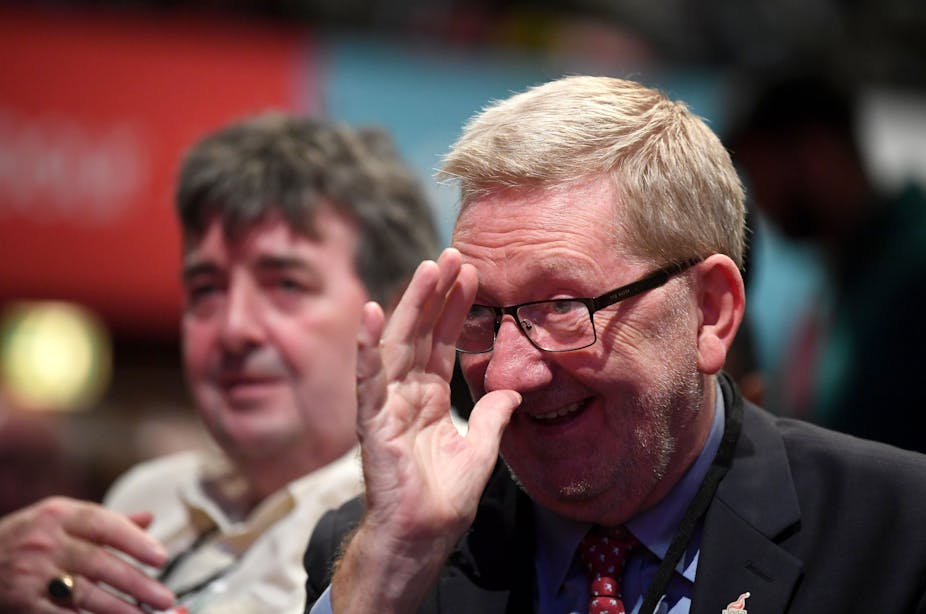Since his election to the Labour leadership in 2015 Jeremy Corbyn has regularly cited the significance of the party’s mass membership. However, the lay members of the “largest political party in western Europe” have increasingly come into conflict with a leader who has spent a lifetime arguing for the supremacy of conference. Somewhat ironically in 2019 Corbyn has relied on the bloc votes of the trade unions, rather than the mass membership which elected him, to push through his policy agenda on Brexit and, to some extent, the Green New Deal.
In his first conference speech as Labour leader in 2015, Corbyn stressed that he wanted “open debate in our party and our movement”. The mass movement which developed around Corbyn’s 2015 and 2016 leadership campaign was scheduled to bring open democracy to the party machine. However, at the 2019 conference the trade union bloc vote continued to wield 50% of the total conference share. Consequently, the unions’ position on Brexit and the Green New Deal has greatly directed the Labour policy decisions emerging from the 2019 conference.
Greenish New Deal
Despite the backing of Labour’s mass membership (and some shadow cabinet ministers), the Green New Deal has opened a divide between the trade unions and members. The deal, which would commit an incoming Labour government to a target of net-zero carbon emissions by 2030, has mobilised a wave of constituency activity within the party. Many even wanted to push for a stronger emissions target.
Yet, the other key component of Labour’s voting system at conference, the trade unions, refused to sign up – in particular the GMB, which represents workers across industrial sectors. Labour’s leadership has also expressed some reluctance. In June 2019, John McDonnell, shadow chancellor, claimed 2030 “isn’t realistic” for the target. On the other hand, more constituency motions were sent to conference (128 motions) in support of the Green New Deal than any other topic, including Brexit. Only nine of the 128 were in support of the GMB position. Alongside constituency support, campaign group Momentum, the CWU and TSSA also support a finite target for net-zero emissions.
The main contention between Labour’s trade union support and its membership is around the impact of the Green New Deal’s net-zero carbon emissions by 2030 on jobs. For the trade unions, particularly those with workers in affected industries such as the GMB, calls for sweeping action against aviation and fracking are a step too far. For the activists within Labour for a Green New Deal, the proposal is meaningless without a target date.
These divides led to accusations that Jeremy Corbyn and John McDonnell are “just not radical enough” on this issue. ITV’s political editor, Robert Peston argued that “Labour members feel trampled on by their erstwhile hero Jeremy Corbyn and the trade union block vote”.
Brexit
Like the Green New Deal, Brexit has caused large-scale internal consternation at Labour’s 2019 Conference; unlike the Green New Deal, Brexit has dominated the political headlines outside of the conference arena. Party activists submitted 90 motions to the conference on Brexit, with 90% of these being “anti-Brexit”. Although Corbyn came out in favour of a public vote before conference, he proposed to conference that Labour’s position during a future referendum should remain neutral. This position, despite strong opposition, was carried by the conference floor on September 23.

Labour’s internal divisions were magnified as the party could not agree on the wording of a Brexit motion to be presented to conference. In the end, they had to vote on two contradictory motions. One demanded a public vote with Labour campaigning for remain and was supported by constituency activists. The other supported the position put forward by the party’s ruling National Executive Committee, which also mandated a public vote but gave no indication as to Labour’s position in any referendum.
The trade unions ultimately held the balance of power at the 2019 conference. UNISON and the TSSA opposed the NEC’s statement. USDAW backed three motions on Brexit, despite the NEC’s statement and Composite 13 being contradictory. On the other hand, Unite, the GMB and CWU backed the leader’s position. Ultimately, this triumvirate saw the majority of the trade union block vote save Corbyn from defeat, in the face of widespread opposition from Labour’s remain activists.

